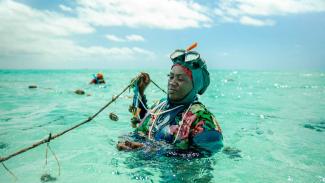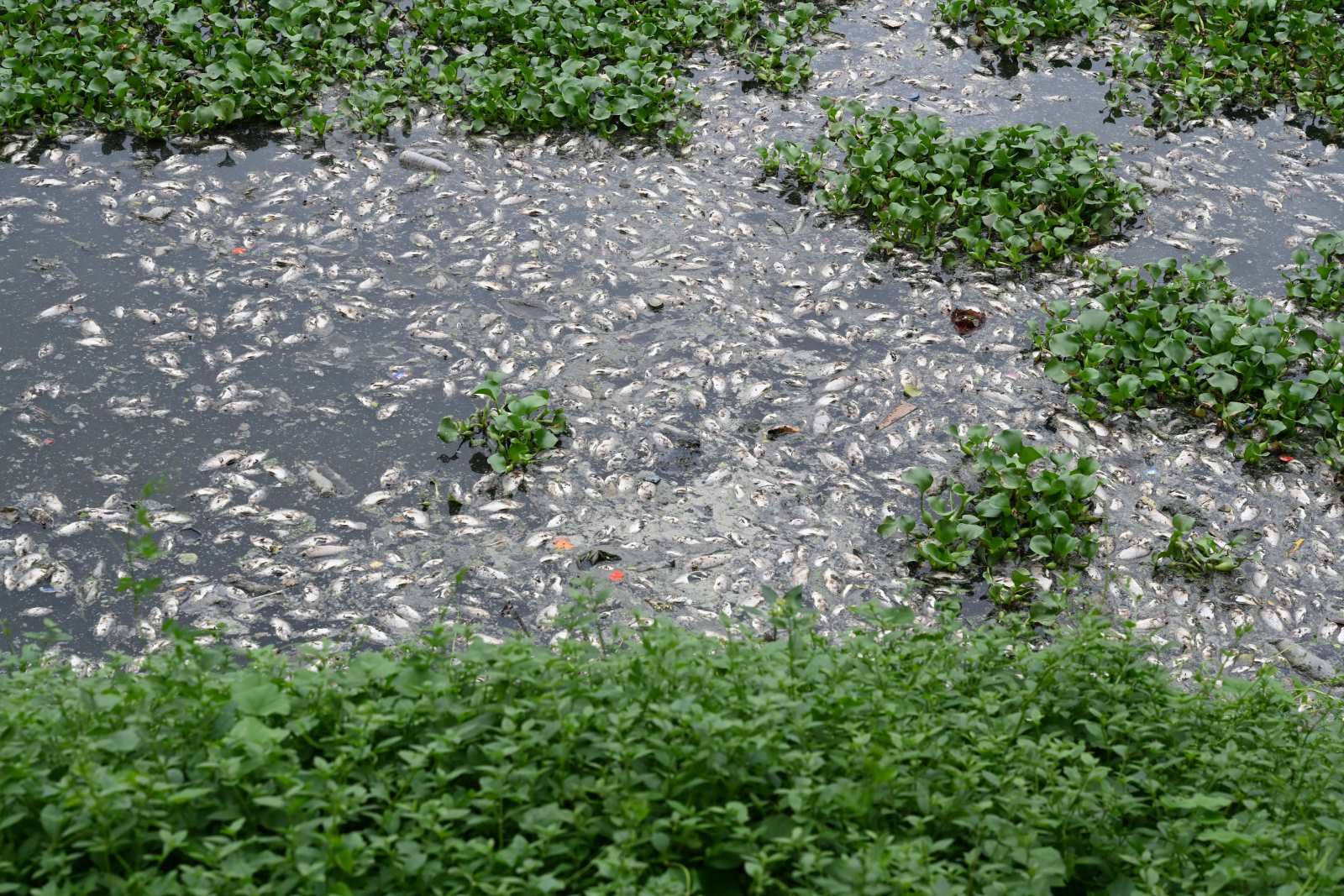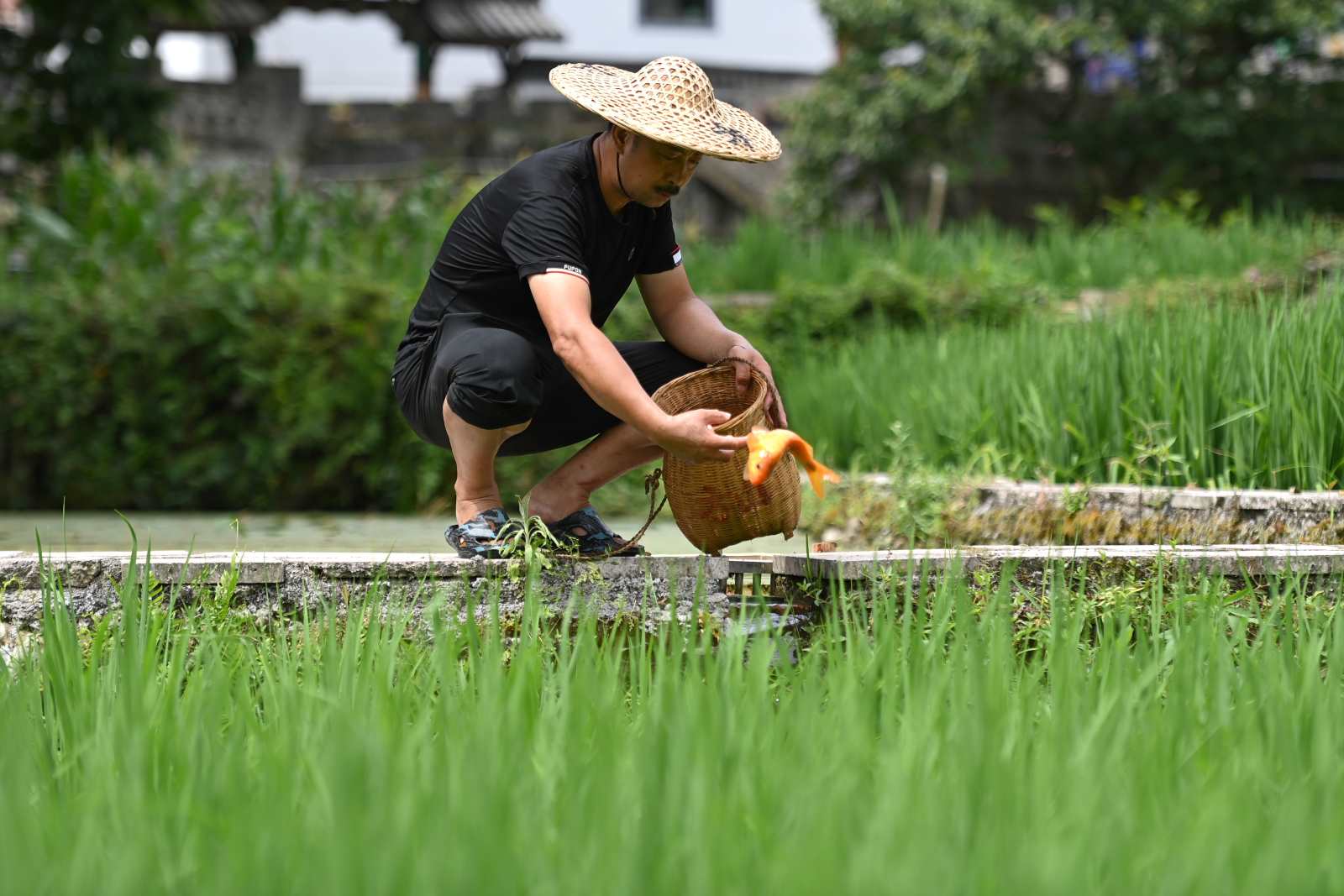Coastal communities
Sustainable sponges

On the coast of Jambiani in Zanzibar, Hindu Rajabu is on her way to her floating sponge farm. She wears swimming goggles and a snorkel on her headscarf as she wades into the Indian Ocean. When the tide rises, she dives into the water to reach the buoys that hold the sponge farm in place.
Rajabu is a 31-year-old mother of two. The search for income has led her and other divorced women and single mothers in Zanzibar to the depths of the Indian Ocean to grow climate-resistant sponges.
Zanzibar, an archipelago off the coast of Tanzania, faces several challenges to its ecosystems and livelihoods. Like many coastal communities around the world, the islands are suffering from the effects of global heating, including rising sea levels. This in turn leads to coastal erosion, threatening homes, infrastructure and agricultural land. In low-lying areas, saltwater intrusion is contaminating freshwater sources, affecting both drinking water and agricultural productivity.
Ocean warming, moreover, has an impact on marine ecosystems, including coral reefs and fish stocks. Coral bleaching, a phenomenon linked to rising ocean temperatures, poses a serious threat to the diverse marine life that relies on these ecosystems to survive. This impacts the fishing industry and food security in the region.
In addition, extreme weather events such as storms and hurricanes are becoming more frequent, causing damage to property and destroying livelihoods.
Sponge farming plays a crucial role in overcoming some of these challenges. Sponges are marine animals that contribute to the health and conservation of coral reefs and the entire marine ecosystem. They also provide an important habitat for numerous marine species and contribute to the conservation of biodiversity.
The sponges also provide an alternative and sustainable source of income for local communities. Traditional livelihoods in Zanzibar often depend on fishing and tourism, both of which can be vulnerable to environmental disruption. Sponge farming diversifies economic activities and reduces pressure on natural resources. Healthy coral reefs in particular are important for fishing, tourism and protecting the coastline from erosion.
Scientists have identified over 15,000 species of sponges. They may have been the first animal on earth and are thought to have existed for over 600 million years. They are resistant to warmer temperatures and filter impurities from the water, reducing marine pollution. A study published in the scientific paper Microbiology and Molecular Biology Reviews shows that up to 24,000 litres of seawater can be pumped through a 1 kilogramme sponge in a single day.
Sponges are used for bathing and cleaning. Natural sponges are the environmentally friendly alternative to harmful synthetic sponges, which contain microplastics that are dangerous to aquatic life.
Research has further shown that the spongy creatures play an important role in combating the climate crisis. Sponges are responsible for dissolving around 48 million tonnes of silicon every year, because their skeletons break down into microscopic pieces of the element. According to experts, the dissolved silicon helps to control the carbon cycle in the ocean and reduce the greenhouse effect.
Shrinking seaweed industry
When Rajabu reaches the buoys, she looks at the sponges floating on a thick polythene rope. She then cleans the rope with a knife to get rid of any hidden bacteria. “They are delicate animals, I handle them very carefully,” she says. To protect the sponges from higher temperatures, Rajabu ensures that they always remain under water. She spends four hours a day taking care of the floating farm.
Rajabu dropped out of school at the age of 17. She started a seaweed farm but earned barely $ 30 a month – not enough to feed her children. The seaweed industry, which once formed the backbone of the Zanzibari economy and employed up to 20,000 farmers, mostly women, has suffered from the rising temperatures. Studies show that the yield and quality of the seaweed has declined drastically due to the sweltering heat, erratic rainfall and stronger winds. According to Zanzibar’s Ministry of Blue Economy and Fisheries, algae production in Zanzibar fell by 47 % between 2002 and 2012 due to the climate crisis, disease and low prices.
Aziza Said, a marine biologist at the University of Dodoma, says sponges are more resistant to higher temperatures, easier to maintain and realise better market prices than seaweed. “They moreover enrich the seabed by releasing fatty and amino acids that can be absorbed by other organisms,” she adds.
Since joining the Swiss non-profit organisation marinecultures.org in 2020, Rajabu has been earning a monthly salary of $ 100. Christian Vaterlaus, the founder of marinecultures.org, set up the sponge farm in Zanzibar in 2009 to help impoverished seaweed farmers earn a better income and protect the surrounding ecosystems. “Single mothers have an especially difficult position in society because they don’t get any support,” he says.
Ali Mahmudi Ali, the project manager of marinecultures.org, says that the organisation has trained 13 women since 2009. “The training is necessary to improve their skills and knowledge of the changing weather conditions,” says Ali. As part of the training, the farmers also learn how to swim, dive, use the equipment, clean and care for the sponges, sort the sponges for sale, market them and keep accounts.
Nasir Hassan Haji is the chairperson of the Zanzibar Sponge Farming Cooperative, a women-led organisation that oversees production activities. She says that sponge farming is reshaping traditional gender roles in the deeply patriarchal Jambiani community, where women are usually confined to childcare and housework. It is a lifeline providing a chance of financial stability, especially for divorced women and single mothers.
Zulfa Abdalla used to spend hours weaving hats to earn a living and support her two children after her husband divorced her at the age of 23. “I never thought that one day I would learn to swim. Surprisingly, it has become my source of income,” she says. After barely three months, Abdalla harvested a bumper crop that earned her almost $ 640. With some of the money, she bought a bed, a wardrobe, a dressing table and renovated her mother’s house.
Patience required
Each sponge is sold for $ 15 to $ 30, depending on size and quality. The products are distributed to souvenir shops and hotels in Zanzibar and abroad. The farmers receive 70 % of the revenue, while 29 % goes to the sellers and the remaining one percent supports the Zanzibar Sponge Farmers’ Cooperative.
However, Vaterlaus says the actual economic yield of the sponges is low. According to him, the business is hardly scalable because the expansion of hatcheries for rearing baby sponges is limited and there is a lack of research funding.
Leonard Chauka, a molecular biologist at the Institute of Marine Sciences at the University of Dar es Salaam, says that although sponges are useful for the environment, their production and distribution are costly and require patience. “Growing sponges takes a long time, and farmers have to wait at least one year for the sponges to reach a saleable size,” says Chauka.
Despite these challenges, marinecultures.org is planning to start sponge farming on Pemba, an island next to Zanzibar, and in Tanga on the mainland coast of Tanzania.
Rajabu says her sponge income has helped her buy a piece of land on which she will build a three-bedroom house. “I have always dreamt of building my own house. Now my children will have a place to call home,” she says.
Kizito Makoye is an environmental journalist from Tanzania.
kizmakoye@gmail.com










